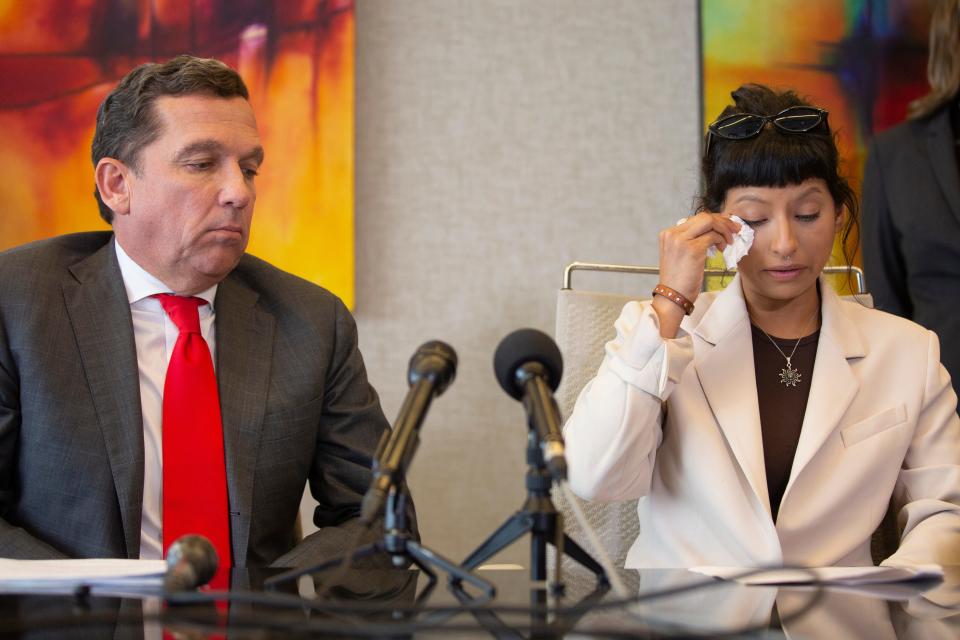Opinion: As distasteful as it may seem, justice system worked in Watson case
- Oops!Something went wrong.Please try again later.
Deshaun Watson should not play a down this year in the NFL − period, full-stop.
There is credible evidence he abused and harassed more than two dozen women. If Watson takes the reigns as Cleveland Browns quarterback, he will be held up − rightly or wrongly − as a role model for young boys already lost in a culture filled with unrepentant toxic masculinity. And he could well be a danger to the women employed by the organization.
Simply put, Watson must go.
But whether he can be criminally prosecuted is another matter altogether.
When a public figure engages in this kind of conduct, many feel an understandable urge to see him behind bars. In this #metoo era, there’s an undeniable satisfaction in seeing serial rapists like Harvey Weinstein belatedly hauled before judges and juries to answer for the harm they’ve caused.
But Watson’s case is different.
Let’s start with a hard truth: Criminal charges require strong evidence of specific kinds of conduct. Sex crimes have very specific statutory definitions, and a prosecutor must present credible evidence of each element of the offense in order to obtain an indictment.
Based upon the public record, Watson allegedly engaged in improper conduct with a series of female massage therapists. His behavior ranged from merely unseemly to assaultive, with several stops along the way.
By their very nature, these encounters present classic "he said-she said" scenarios. Absent some tie-breaking piece of physical evidence − bodily fluids; videos; texts or voicemails admitting to or otherwise attesting to the conduct − such crimes are nearly impossible to prosecute.

The public has seen this play out before. Indeed, there is a bizarre cottage industry of celebrities who allegedly abuse massage therapists. Public figures ranging from Brett Favre to Al Gore have faced such claims. And let’s not forget whatever happened with New England Patriots owner Robert Kraft.
None of these men did any jail time (Kraft was the only one criminally charged, but the case was ultimately dropped). In each case, the "he said-she said" nature of the incident made probable cause difficult to establish, much less proof beyond a reasonable doubt.
Many would argue we should simply change the rules for serial sex offenders like Watson. But even though many states have expanded the statute of limitations for sex offenses (making it possible to charge for older crimes), the basic rules of criminal procedure remain firmly in place.
In the American system of justice, we don’t convict people based upon their previous misdeeds. Judges carefully police what "other acts" evidence is allowed before juries. A prosecutor cannot simply say, "He’s done it before − convict him." Nor can he say, "Look at all of these other women who have accused him − where there is smoke there is fire." Bill Cosby’s conviction was recently overturned on precisely these grounds.
When evaluating cases like Watson’s, we should always remember the "brother and uncle test." That is, if your brother or your uncle was − God forbid − accused of such conduct, wouldn’t you want to hold the prosecution to its burden in every conceivable respect? Wouldn’t allowing previous (and even uncharged) allegations to influence the outcome seem fundamentally unfair?
Of course, this lofty constitutional discussion leaves out the 20-plus women who were victimized at their workplace by an entitled professional athlete. After a Texas grand jury declined to indict, most of them agreed to financial settlements in exchange for not suing Watson.
Should it be legal?
The answer, for better or worse, is yes.
Lawsuits are settled every day, for myriad reasons. While it may look like the women are being "bought off," the settlements provide at least a measure of justice and compensation. Imperfect? Without a doubt. But it is the best our system allows under the circumstances.
In recent years, our public universities have provided a cautionary tale of what happened when we dispense with due process and try to litigate "he said-she said" situations with no other evidence. (The end result is, sadly, more litigation, more uncertainty and no justice for either party.) As distasteful as it may seem, the system worked here. It’s now up the Browns organization to do its part and send Deshaun Watson packing.
Jack Greiner is a partner at the Graydon law firm in Cincinnati. He represents Enquirer Media in First Amendment and media issues.

This article originally appeared on Cincinnati Enquirer: Opinion: As distasteful as it may seem, justice system worked in Watson case

